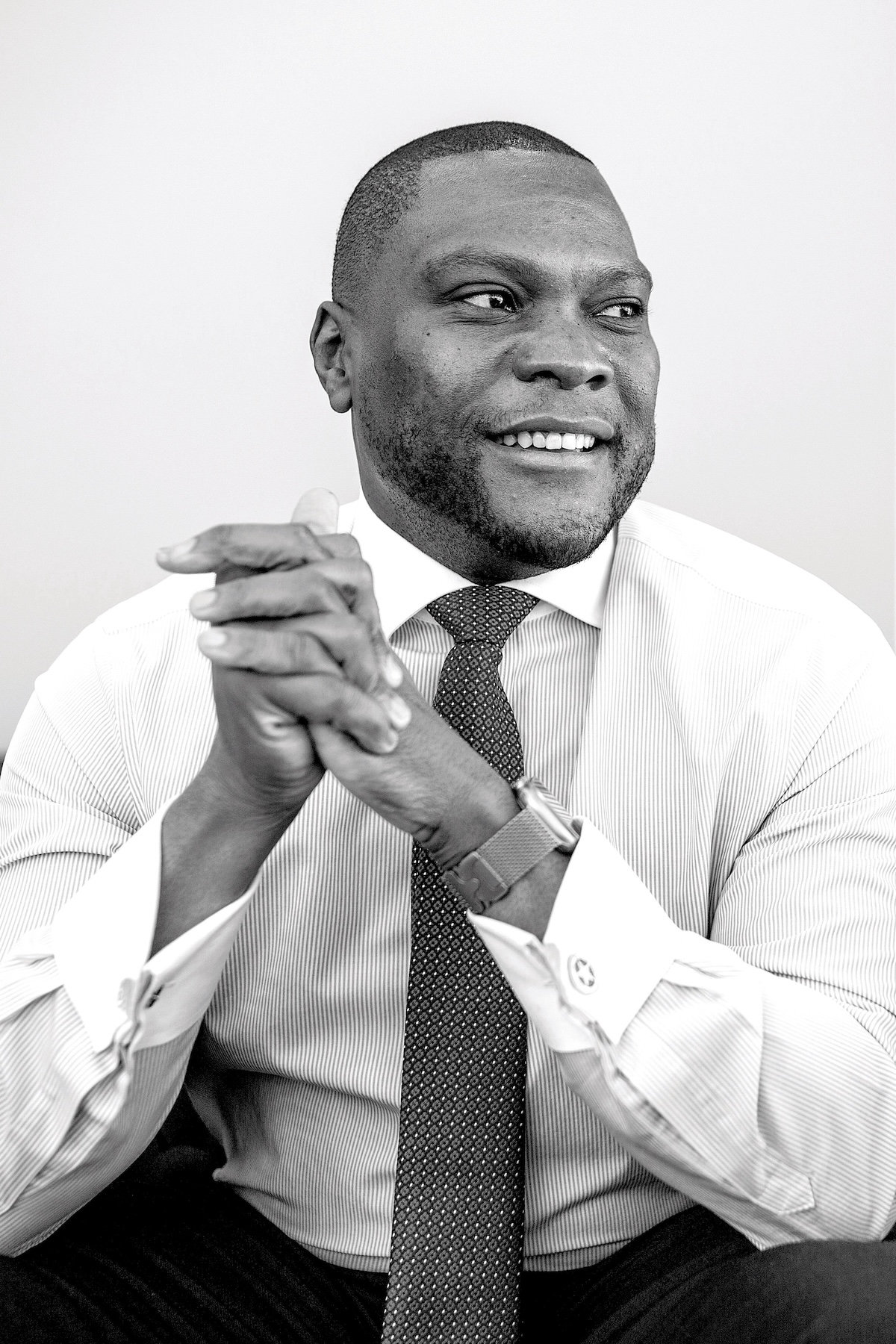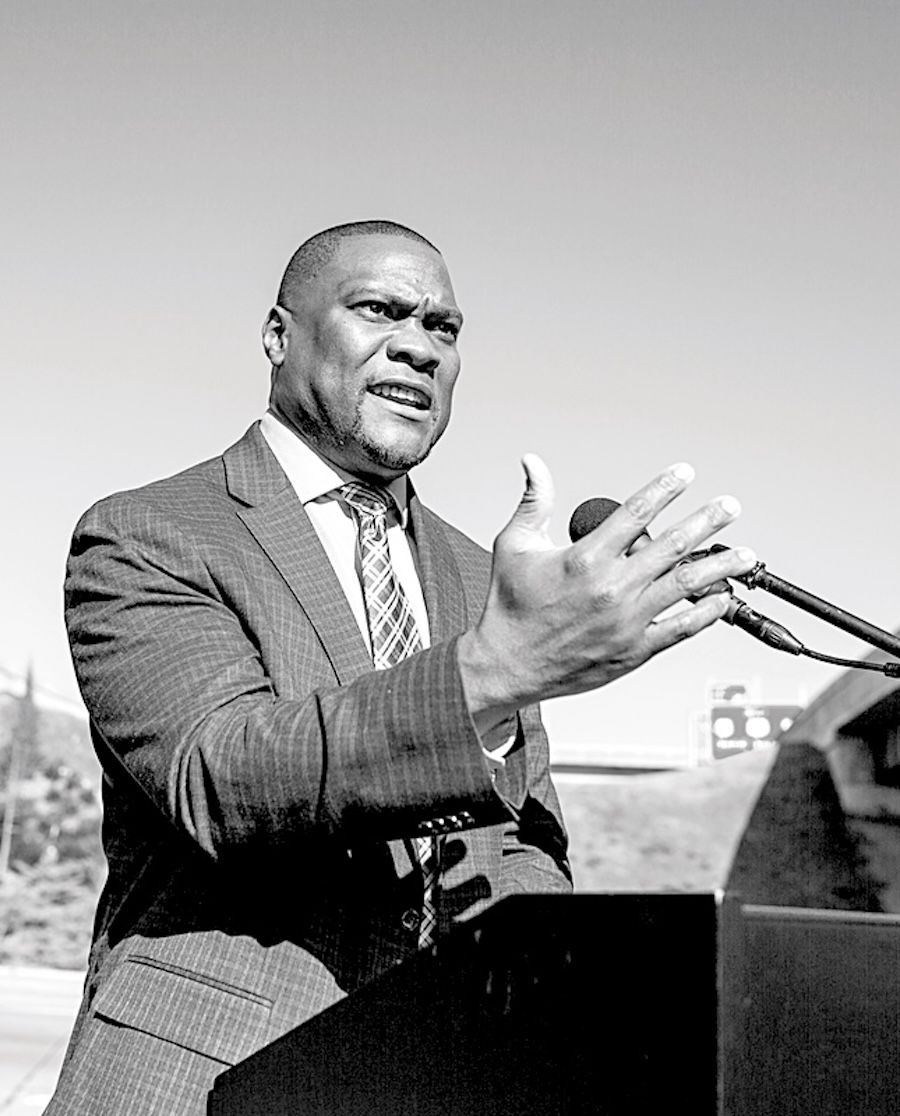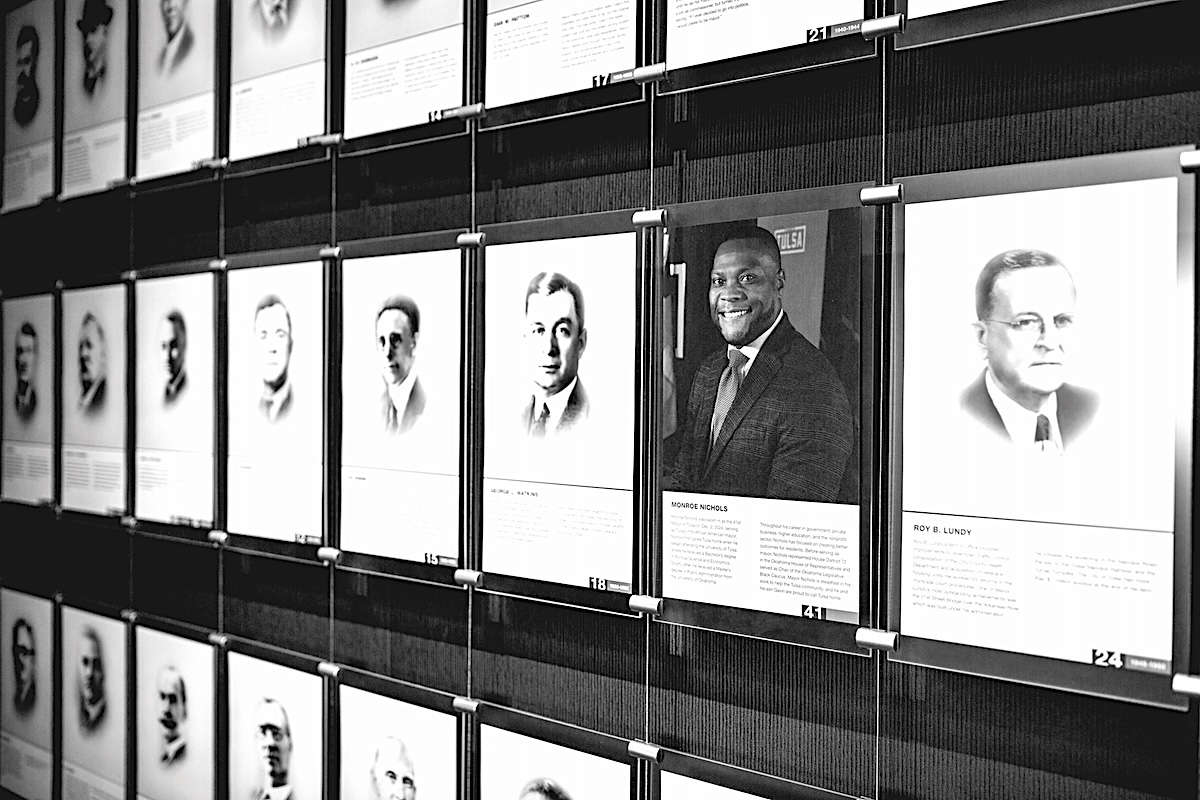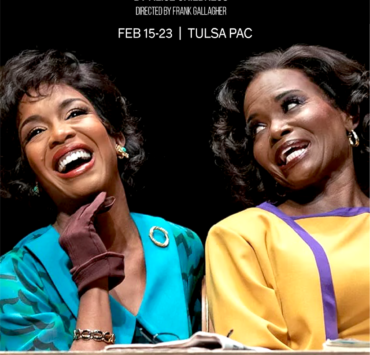
LOCAL & STATE
Kimberly Marsh
Monroe Nichols, Tulsa, Okla. mayor. Photo, Basil Childers, The Oklahoma Eagle
During a cold weather spell just a few weeks after his Nov. 5, 2024, election, Tulsa Mayor Monroe Nichols personally visited city warming stations and shelters to check on the well-being of people seeking services there. He spent some time with three people, and the experience deepened his sense of humanity. It also reaffirmed his commitment to addressing the needs of Tulsa’s homeless population and providing affordable housing for the city’s residents.
In an interview with The Oklahoma Eagle, Nichols shared the story of a woman sheltering at the Trade Winds motel. This tale may resonate with any Tulsan who has passed one of more than 1,400 people experiencing homelessness and living in poverty on the streets of Tulsa.
The Tulsa Day Center had recently received a grant to house people at local motels, so Nichols took the opportunity to talk to people sheltered there to better understand their life experiences. A middle-aged woman told him how she had gotten into her circumstances. She had been a teacher and fallen into a bad relationship. That led to a downward spiral. She lost her teaching contract, her income, and her home. After being evicted, she had been living on the streets.

“She told me a couple of things that blew me away,” Nichols told The Oklahoma Eagle. “One, she asked me why I thought that women who are unhoused wore so many clothes in the summer. She said, ‘Because it makes us less likely to get raped.’
She told me that she started using drugs on the streets to try to stay awake for her personal safety. She told me – and this is what changed my interaction with people – when she was kind of new on the streets, she tried to say stuff to people, and they just walked by and wouldn’t say anything to her. One day, she had a kind of a (mental) break. She comes up to this guy, she’s yelling at him. She asked him, ‘Can you see me? Can you see me?’”
The woman told Nichols she thought she was invisible because people would walk by her and not say anything when she was speaking to them.
“She was just telling me how it just kind of stripped her of her humanity, and it actually changed my interaction as I’m going by folks,” Nichols said. “I’ve never been one to really just outright ignore folks, but oftentimes, if I’m honest, I’ve said I don’t have any cash without them ever asking me what they were going to ask. They haven’t even asked for directions. But I would always say this very dismissive thing so that’s actually changed my behavior personally because of what she told me. But it also, in a lot of ways, made this issue one that was far less abstract to me.”

Nichols continued: “Everybody’s on the streets for different reasons, I’m sure. But I think for me, you think about the phases in which somebody falls deeper and deeper into chronic homelessness. Some people say, ‘Oh, it’s drugs’ and that is true for some people, but there are stories like that where somebody’s been completely stripped of their humanity, and you wonder why they’re chronically homeless. But you don’t wonder why you look at them as though they don’t exist, right?
So, it begins to make a lot of sense. I think that’s been for me, a huge difference maker on that particular issue. It’s done everything from changing my commitment to this just as being an issue. It’s also changed how I’ve personally interacted with people I come across every day.”
Fulfilling campaign promises
During his mayoral campaign, Nichols focused on the key areas he wanted to prioritize over the next four years. His list included ending homelessness, improving student outcomes, expanding economic opportunity, making Tulsa the safest big city in America, increasing affordable housing, and improving relations and co-governance with tribal governments.
On Inauguration Day, the new mayor named the team of people who will help him accomplish these goals. They included five advisors and a scheduler, followed by a city administrator and a sixth policy advisor to begin building his staff of 16-at will appointments to accelerate the progress of strategies proposed during the campaign.
The top team includes Gene Bulmash, to advise on housing, and Emily Hall, to work with Bulmash but focusing on homelessness. Just a few days later, a group of public, nonprofit, and private sector leaders announced a Housing Partnership Network to make strides in fulfilling Nichols’ goal to provide 6,000 new housing units by the end of his four-year term.
Shane Stone was named the government affairs director, and former Tulsa Police Capt. Laurel Roberts was named public safety commissioner to foster accountability, improve response times, and work with the chiefs of the police and fire departments to implement modern strategies through a positive, solutions-driven department culture. City Administrator Mike Miller will handle the administrative functions, similar to what a city manager would do, freeing up more time for Nichols to meet with the public and people in need, as he did when he visited the shelter.
Former State Rep. Amanda Swope (Osage/Muskogee tribes) will lead tribal policy and partnerships, which is especially important as all parties work to navigate what issues could still occur as implications of the 2020 McGirt court decision reaffirming that much of eastern Oklahoma, including Tulsa, remains Native American reservation land and restored jurisdiction for crimes involving Native Americans on sovereign lands to the tribal and federal authorities.
Nichols also pulled from existing City staff to fill the crucial role of Deputy Mayor, appointing Krystal Reyes, who has more than five years of experience with the City of Tulsa as the chief resilience officer and previously led family and children services in New York City. As Deputy Mayor, Reyes will oversee the mayor’s education, youth, and resilience initiatives.
The 16 appointments Nichols made are critical yet small pieces of municipal government. The mayor is the chief executive officer for an organization of more than 3,500 employees, which requires balancing time between executive leadership, administrative work, and performing as the city’s primary ambassador.
On the campaign trail, city candidates often zero in on improving the complex set of commercial development requirements, processes and policies, and that was no different in the 2024 mayoral campaign. How a city handles its development services can impact how business-friendly developers perceive the city among other municipal competitors.
Nichols acknowledged and praised city leadership already in place for working their best with the resources they have. But he said they can feel they have a target on their backs during a campaign.
“I have to say, when I got elected, I had a little anxiety about how I would be received by employees here, because I’ve spent the better part of a year and a half talking about how things need to improve. And some folks could take that as being critical about them and the job they’re doing, not that that’s how you meant it,” Nichols said.
He specifically gave a shout out to Michael Skates, director of development services who oversees the business and building permits.
“I campaigned on certain things that I think are high-profile issues,” he said. Since assuming office, he has been talking with the directors “who are owning those areas.”
“There’s somebody in the building who’s already thought about it,” Nichols said.
“It hasn’t been, ‘oh, let me roll in and tell you guys how to do it.’ It’s saying, ‘hey, here’s the challenge that we’re facing. This is where we’re trying to get to. Here’s my approach to getting that done.’ And then you pressure test it against people who are here, and you just do that so you don’t make bad decisions. Finding out ways in which we tease that out and make sure we resource it or empower people in the most appropriate ways is how we get there.”
As an example of how complex solving problems can be, he discussed animal services’ challenges in securing unleashed dogs around the city. Rounding up loose dogs that present a public health and safety hazard for children walking between home and school was one of the most prominent issues on the campaign trail and voiced as part of a community-wide agenda during city forums. In diving into the issues with the animal services staff, Nichols said the difficulties lie in the insufficient capacity of holding spaces, limited staff to pick up loose dogs, funding constraints that call for creative ideas for resourcing. The conversations revealed that an answer might be obvious, but not easy, or that an answer may be easy, but not obvious, he said. He added that complexity is something that intrigued him from a planning and policy perspective.
“It is an interesting piece, though, because it’s like, here’s this intervention that we know impacts public health, public safety, education, but we don’t resource it that way because it’s not just about making more spaces for animals. It’s also about how are we spaying and neutering, and how are we better partnering with rescues? How are we making really hard decisions about enforcing laws on the books? We have to resource it appropriately, which I don’t think that we’ve done,” Nichols said.

Family men
Anyone following Nichols on the campaign trail witnessed his 16-year-old son, Gavin, often by his side. While Nichols jokes that Gavin arrived at events after “kicking and screaming,” it was the Bishop Kelley High School student’s own idea to be with his father during important moments. Nichols says the same about spending time with Gavin and showing up for his moments as well even as a state legislator who commuted between Tulsa and the capitol. Gavin’s sporting events are representative of a greater bond that holds the extended Texas and Oklahoma-based Nichols families together.
Nichols’ father, Monroe Nichols III, a Baytown, Texas police officer, died in 1997 from a heart attack at age 35, when Nichols IV was just 14 years old. During the interview with The Oklahoma Eagle, he spoke about his father’s death in a deeply personal way describing the feeling of two losses – the life of the father he knew and the lost relationship he had hoped to have as he got older.
“My dad was to me the most charismatic person you ever met. A lot of fun. I was just two years away from driving and I was really excited we were going to be spending all this time together,” Nichols said. He shared that on the day of his father’s death he went into a bathroom to be alone and cried.
“I knew if people saw me crying, this would be a whole thing, but I needed to process it, because I was trying to figure out what was going on. No kid knows how to really deal with that, especially with all the high emotion in the room next to you. And I remember just telling myself, if you get through tonight, it’ll be alright. Then it was like, get through tomorrow, it’ll be alright,” he said.
Naturally Nichols IV wondered what his father would think of him becoming the first Black mayor in a city of more than 400,000 and the site of one of the worst domestic terrorist acts in the nation, the 1921 Tulsa Race Massacre in the Greenwood District.
“So when I won, I was kind of living a life for two people a little. My dad’s name is also the name that everybody now knows for making history. It ended up being alright,” Nichols said.
Pressing on
Nichol’s father’s death became a driving force in his life, motivating him to pursue becoming a college athlete and other goals. His paternal grandfather, Monroe Nichols Jr., took up part of the void the younger Nichols left. Nichols Jr.’s obituary described a man who was adventurous, unafraid to look for “what was on the other side of the mountain,” and a legacy to his children, grandchildren, and great-grandchildren.
Until his grandfather’s 2020 death, he spent his retirement years traveling Texas and Oklahoma to get to all of the grandchildren’s sporting events. Nichols said his grandfather was nonjudgemental, funny and only got angry once that the grandchildren could remember. On a Thanksgiving Day in Dallas, an uncle made a disparaging remark about Herschel Walker, then a Dallas Cowboys player, causing the elder Walker fan to pick up his turkey and return to his Houston home.
“We were all like, ‘we’re not eating Thanksgiving dinner because you said something about Herschel Walker,’” Nichols laughed.
To honor him, Nichols had a tattoo inked onto his right wrist that says I Press On, which refers to a Biblical verse in Philippians 3:13-14, wherein Paul uses a runner’s metaphor to describe his spiritual goal.
“My dad’s gone. My grandads’s gone,” Nichols said. “At 14, I remember putting my head in my hands, so it’s a reminder when things get really hard. That’s why it’s there.”
Nichols uses that inspiration in all that he does, including becoming mayor of Tulsa, and he knows that huge decisions will drive big changes that will sometimes be controversial. Over the next four years, there will be many issues to work out, from the call for reparations for victims and families of the 1921 Tulsa Race Massacre to creating 6,000 new housing units to determining how to proceed with tribal relations, Nichols said. He appears ready to work with the community to review the challenges, recommend solutions, and make the hard decisions.
“All these things are going to be things that people are going to have strong opinions about, on both sides of it,” Nichols said. “We’re in a crisis in a lot of areas because we were a little too careful for a little bit too long, and we’ve just got to go out there and do it. And if we believe that we’re doing the right thing, and we can see positive outcomes out of it, well, is it the right thing to do, even if you decide not to vote for me in four years? I’d rather be as excellent as possible in four years, instead of being mediocre for eight.”
Kimberly Marsh, who reported and wrote this story, is a senior contributor to The Oklahoma Eagle. She has devoted a big part of her career to chronicling the policies of Tulsa’s city leaders.










